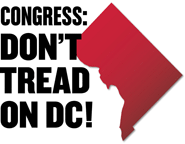Don

By Bill Daehler
To read the “Chapter Leaders Roundtable Report” by Eric Nguyen, click here. (The Humanist Network News email included the wrong link. We regret the error.)
The budget battles in Washington will have a profound effect on nearly everyone in the country with cuts hurting everyone from Maine to Hawaii. But in no area do these battles have such an effect as on the battleground: Washington, D.C.
The recent round of budget battles has left the District of Colombia reeling from millions in budget cuts, a GOP imposed social agenda and the subsequent arrest of D.C. Mayor Vincent Gray and six City Council members. The most prolific measure of the budget “compromise” is the termination of a locally funded program to provide abortion services to low-income women. Increased funding for a school voucher program—which would see your taxpayer dollars funding religious private schools—and cuts to D.C. services are among other provisions in the Fiscal Year 2011 budget.
Washington D.C. had joined 17 states in providing abortion services to low-income women before the program was bartered away by the White House. The ban on abortion funding was lifted in 2007 with the support of the new Democratic majority in Congress. Now that the tables have turned, it appears the short lived program was used as a bargaining chip by the White House. Low income women in D.C. will now have to look to nonprofits for reproductive health services because their tax dollars cannot be allocated according their wants and needs, but rather at congressional whims. Whims that lead one D.C. Planned Parenthood location to inform 28 low-income women their scheduled operations would no longer be covered by their D.C. Medicaid, leaving them financially liable, and unable to pay for the procedure.
Another major initiative forced onto D.C. residents by the Republican Congress is increased funding for a school voucher program, which has a powerful patron in House Speaker John Boehner. The budget compromise provides $77 million for District schools, $20 million of which is for charter schools. This controversial program takes some kids from some schools deemed to be failing and provides them vouchers to attend private schools; many of which are religious schools. So it should come as no surprise that the District’s sinking Catholic schools will be major benefactors of this provision. In fact, Catholic schools have long been championed by Boehner, who attended a Catholic high school. The Washington Post reported last month that Boehner has raised more than $6 million for the District’s Catholic schools since 2003.
Other cuts to the District include a $17 million cut to D.C. Courts and $10 million from D.C. Water. Many cuts were supported by the President and local leaders as wasteful spending but the congressionally imposed GOP social agenda mostly targeting the District’s low income communities has drawn most the ire of residents.
Part of the reason D.C. residents are so resentful of these measures is that they do not have representation in Congress though they pay the same federal taxes as everyone else. Since 1970, residents have had the right to vote for a congressional delegate (with strings attached). Current D.C. Rep. Eleanor Holmes Norton can vote in committee but not on the House floor. Furthermore, due to the special constitutional status of the District of Columbia, it must have its budget reviewed by a Congress in which it is lacking representation. Historically, Democrats have given the left-leaning capital of the country far more autonomy than Republicans.
Mayor Gray, along with six members of the City Council, was arrested outside the Capitol for protesting the intrusion onto the Districts’ sovereignty. The arrest and widespread anger with Congress has left many in the District searching for recourse. Many D.C. advocates are equally fed up with President Barack Obama for his lack of support for the District. This lack of support leaves D.C. residents waiting for statehood, equal representation, or some semblance of equal citizenship from national leaders.
However, there were some projects that Democrats managed to save from the Republican chainsaw, such as an EPA proposal for cleanup of the Chesapeake Bay and the continuance of a local needle exchange program to combat an HIV/AIDS epidemic. The needle exchange program is a crucial public health measure in the District, with a rate of HIV/AIDS higher than any state in the country.
For the nearly 600,000 residents of the District of Columbia, the cry of “no taxation without representation” has been, and will continue to be, the rallying cry for suffrage for all. Residents of the District of Colombia understandably feel disenfranchised; they are bitter subjects to a GOP social agenda and their autonomy is seen by national Democrats as useful prize to haggle away. As the fight for the right to political representation continues, the residents of Washington D.C. have turned the tables on the Tea Party with a new rallying cry: “Don’t tread on me.”
Bill Daehler is the communications intern for the American Humanist Association. He is a senior majoring in political science and journalism at the University of Kansas.
